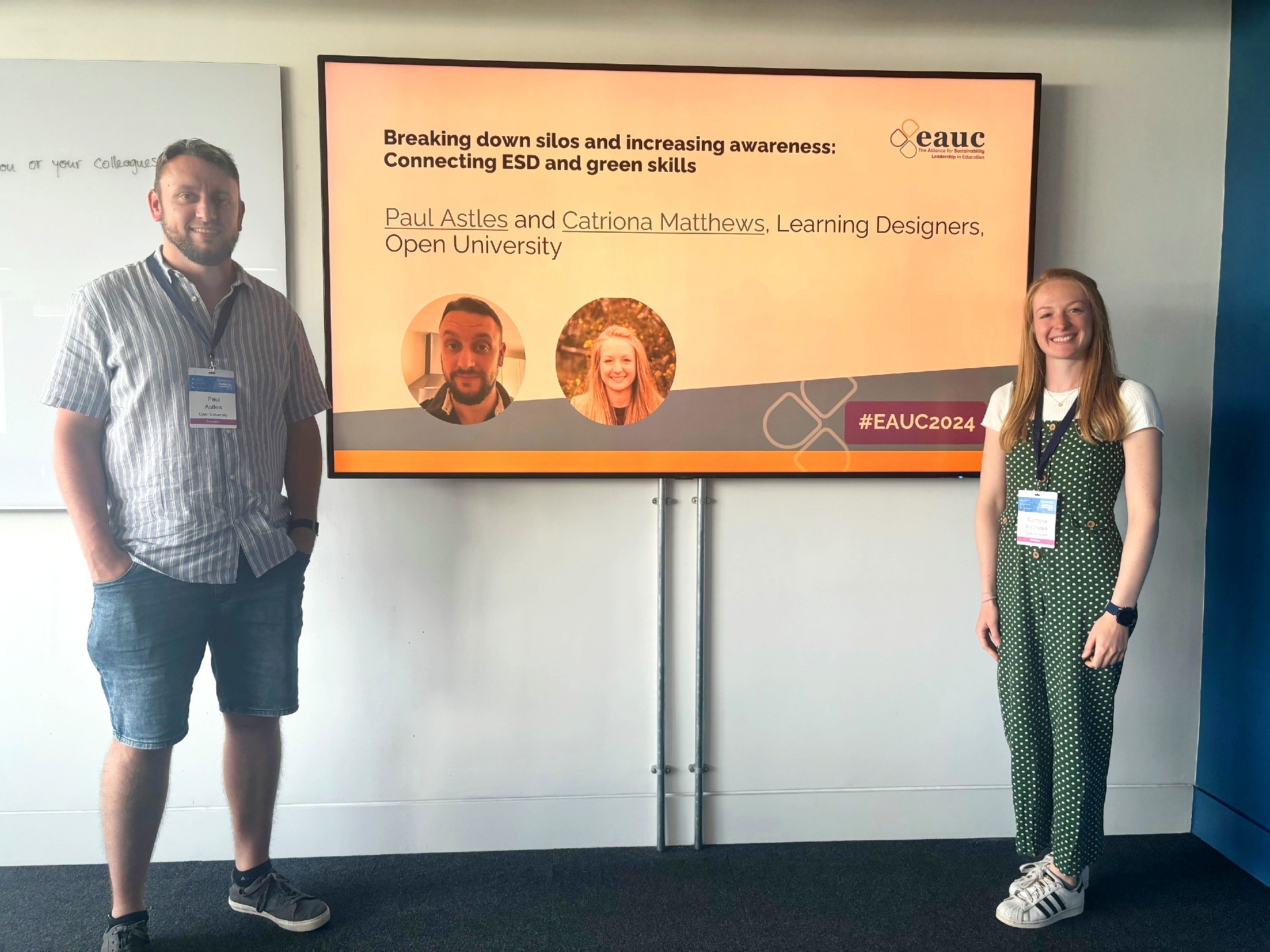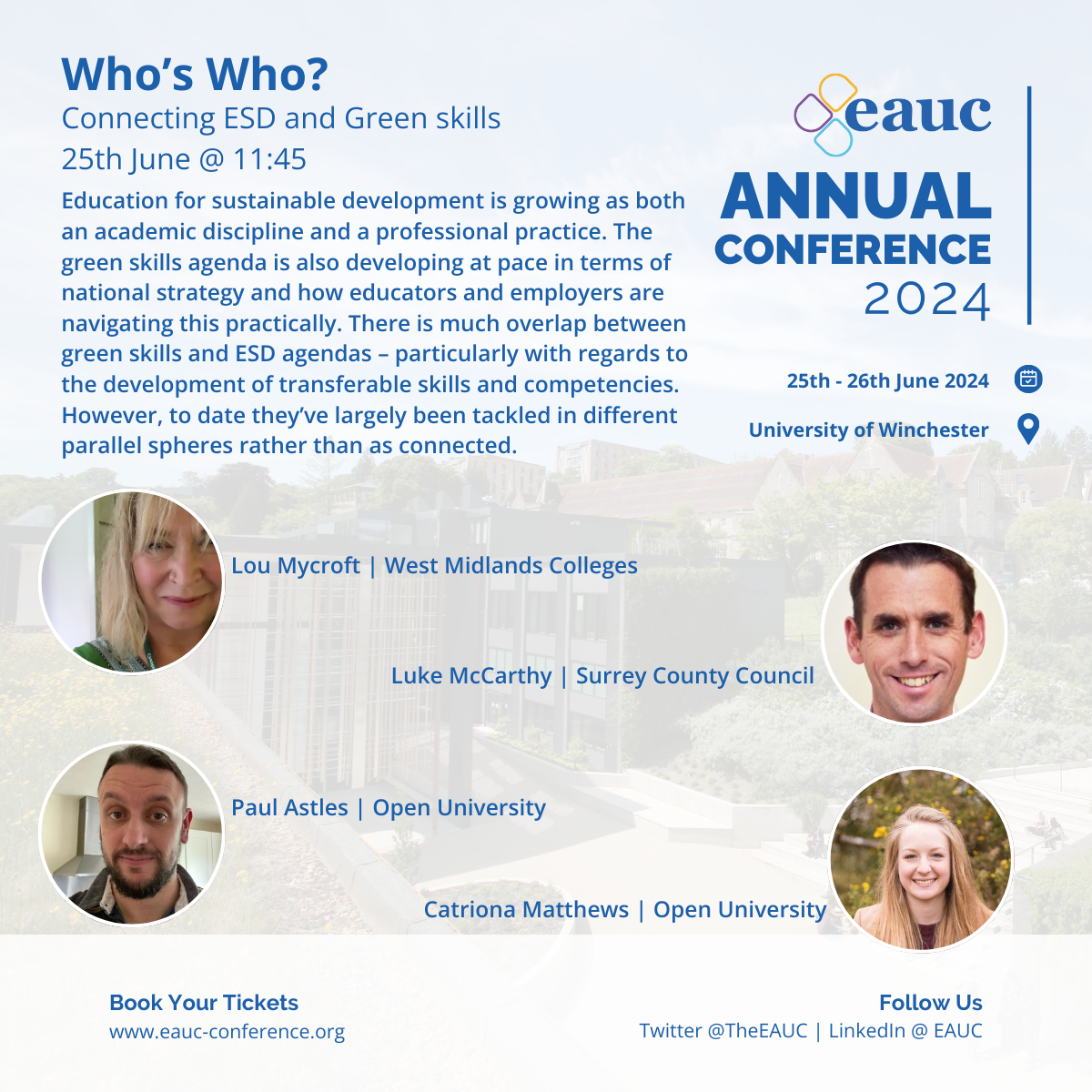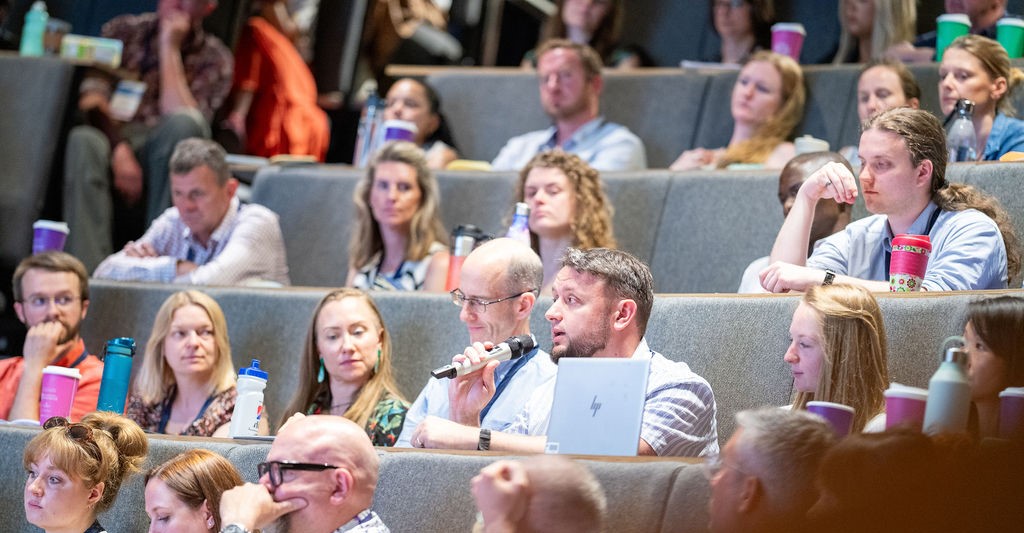Catriona Matthews and Paul Astles ~ Learning Designers
From the 25th to 27th June 2024 we travelled to the University of Winchester for The Alliance for Sustainability Leadership in Education (EAUC) conference and its 20th birthday celebrations. As well as the usual conference fare, we faced moral quandaries in an SDG focused game where we had to take on the role of global powers and negotiate to narrow down the 17 Sustainable Development Goals (SDGs) to just 6, we bopped to a silent disco, sipped on coffee from cups made of recycled chewing gum, and enjoyed some fantastic vegan cookies courtesy of the conference’s plant based catering approach.
The conference wasn’t just about fun and games but we appreciated these light-hearted reprieves as we discussed the gigantic question of how we, as educators, and members of higher and further education institutions, work to address the behemoth sustainability challenges the world is faced with. We’d like to share with you the thoughts and learnings we took away and hope to carry forward into our own practice.
Invited to speak
Our excitement around what proved to be an excellent conference and learning opportunity was increased by the fact we had been invited to be speakers. On the first day of the event we were on the panel of a lively session with other colleagues across the sector (see images below) exploring the differences and similarities between Green Skills and Education for Sustainable Development (ESD) and shared insights from our work so far.


The session was largely focused on getting participants to talk to one another and to co-create a mural which captured the messiness of sustainability skills frameworks in practice.
Our panel experience set the tone of what was the key theme for us of the entire conference – connection. All the sessions we attended – most of which were focused on Education for Sustainable Development (ESD) – involved elements of discussion and reflection.

It was clear that across the sector so many of our colleagues, whether they are just starting their journey towards sustainability or well on their way, are grappling with similar questions and challenges. We found this reassuring in a way because when we work in silos it can be easy to forget that the challenges we face aren’t always unique. It’s when we connect with others, listen, and transparently share what has gone well and (maybe more importantly) what has not, that we move forward. It may sound cliché, but a problem shared often is a problem halved.
Connecting for sustainability
Sustainability comes in all shapes and sizes and in this instance, we reflected that we could work more sustainably by continuing to connect with others through peer feedback, sharing resources, and learning from others’ practices. Whatever stage of your journey you are at it can be helpful to have these conversations as sometimes it can be reassuring to hear about the messy, unrefined stages of problem solving!
One session, focused on bringing together Sustainability and EDI work, offered some important suggestions on how to ensure connections are meaningful and productive. It was argued that before we can meaningfully connect with others to tackle a problem, we need to outline clear and common aims of what we want to achieve because if we can’t be transparent about our goals others will struggle to identify how they might support it.

As we attended more sessions and spoke to a wider range of colleagues throughout day one it became clear that ‘connection’ is undoubtedly an important and impactful way to meaningfully engage with sustainability. For once we don’t mind that we have lots of emails waiting for us so we can start building even more connections!
Embody, not just embed
Another enduring message from the conference was the need to ‘embody’, not just ‘embed’, sustainability. Embedding sustainability in curricula, in our work, and in the professional communities around us is a worthy aim but it can unfortunately be seen as a tick box exercise and doesn’t always meet the deep levels of change needed to address the sustainability problems we face.
The challenge that was put to us, and that we put to you, is to embody sustainability (in whatever ways that looks like for you) so we can empower change in others. To help us embody sustainability, we need to develop our skills as ‘reflective practitioners’. We live in a wonderfully diverse world, made up of different experiences, views and priorities which can sometimes make change a challenge, but these differences don’t mean that change and collaboration can’t happen.
We heard an inspiring example from the further education (FE) sector where tutor/teachers are often dual professionals – part industry expert, part educator. Some teachers felt their knowledge of sustainability was too low to effectively embed it and that they didn’t have the time or space within the requirements of their awarding bodies to engage with it. The speaker reflected on the barriers their colleagues faced, adjusted their approach, and met colleagues where they were. They recognised the teacher’s knowledge of industry is ‘gold dust’ and could provide ways to embody sustainability authentically and meaningfully. Reflection is an important part of our professional practice.
Paul has previously written a blog about reflective practice which, although not explicitly about sustainability, you might find a useful read.
Call to action
If you’d like to talk with the Learning Design team at The Open University about any sustainability related design support you’d find useful for your organisation, whether that’s running a session for you, helping you to use some of the resources we’ve shared via this blog, or simply for a bit of advice, we would love to hear from you.
We’re also keen to learn about your journey in the context of sustainability. Are there resources that you have used to support colleagues with embedding sustainability that you’d recommend to us? Please contact us at: [email protected].
For more information on sustainability at the OU visit Sustainability at The Open University.
Banner image via Canva / HerbySussex

